Master Your Circadian Rhythm: Strategies for Better Sleep and Health
Master Your Circadian Rhythm: Strategies for Better Sleep and Health
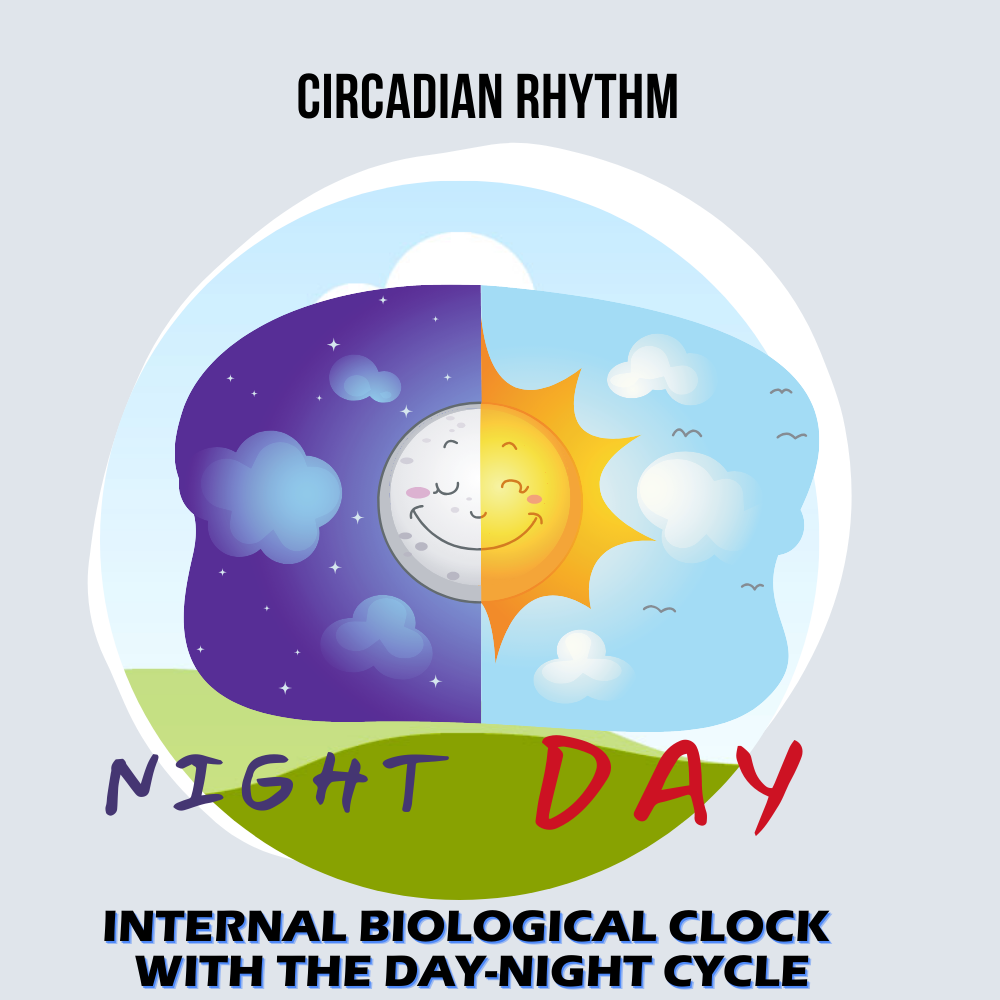
Introduction to Circadian Rhythm
- Definition and basic concepts: Circadian rhythm refers to the approximately 24-hour cycle of physiological processes in living organisms, including sleep-wake cycles, hormone secretion, body temperature regulation, and metabolism. It is driven by an internal biological clock and is synchronized with the day-night cycle.
- Importance of circadian rhythm for sleep and health: Circadian rhythm plays a crucial role in regulating the timing and quality of sleep, as well as various bodily functions essential for overall health and well-being.
- Overview of the body’s internal clock and its regulation: The suprachiasmatic nucleus (SCN) in the hypothalamus acts as the master clock, receiving input from light-sensitive cells in the retina to synchronize circadian rhythms with the external environment.
Understanding the Circadian Clock
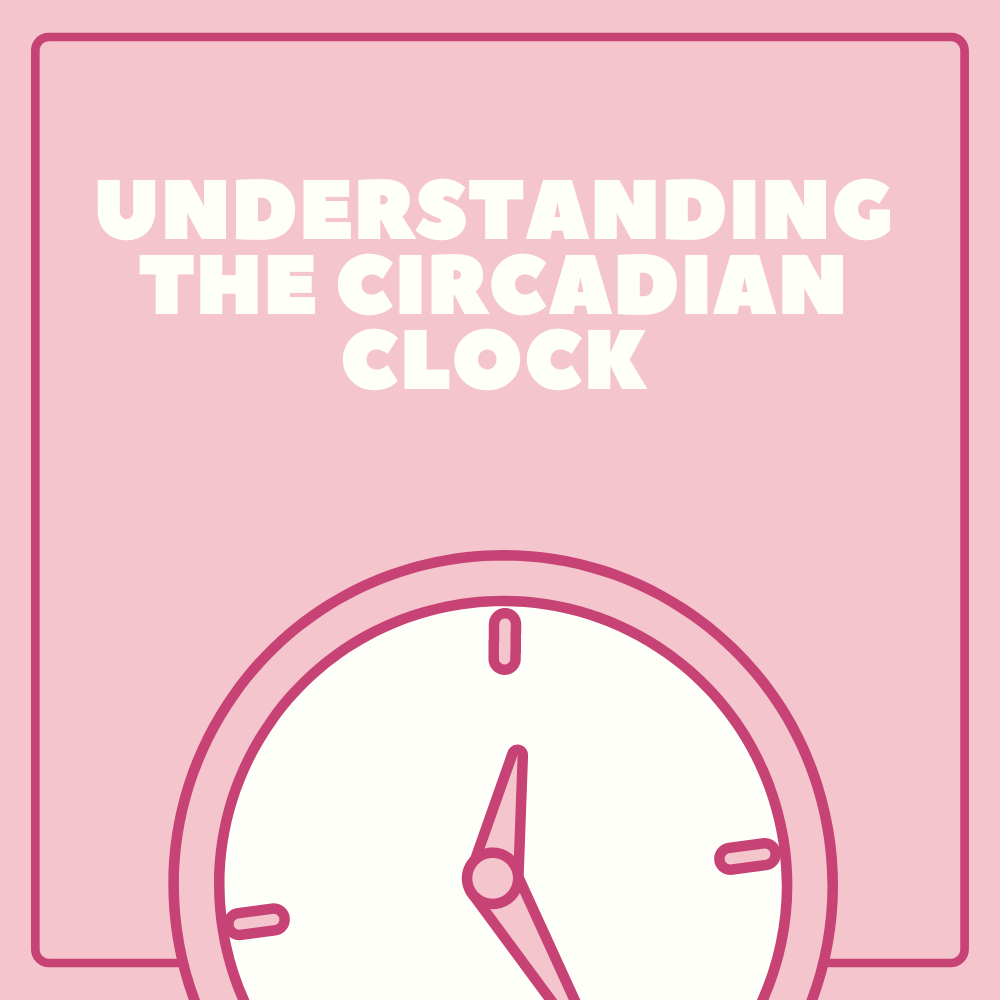
- The role of the suprachiasmatic nucleus (SCN) in the hypothalamus: The SCN serves as the central pacemaker that coordinates the timing of circadian rhythms throughout the body. It receives signals from the retina regarding light exposure and communicates this information to other brain regions and peripheral organs.
- How light exposure influences the circadian rhythm: Light is the primary environmental cue that entrains the circadian clock to the 24-hour day-night cycle. Exposure to light, especially in the morning, helps synchronize the internal clock with the external environment.
- Circadian rhythm’s connection to other physiological processes: In addition to regulating sleep-wake cycles, the circadian rhythm influences the timing of hormone secretion, body temperature fluctuations, digestion, and cellular repair processes.
Factors Influencing Circadian Rhythm

- Genetic predisposition and individual variability: While everyone has an inherent circadian rhythm, genetic factors can contribute to individual differences in circadian preferences, such as being a “morning person” or a “night owl.”
- Environmental cues such as light exposure and meal timing: External factors like the timing of light exposure, meal consumption, and social interactions can influence the timing and stability of circadian rhythms.
- Impact of lifestyle factors: Modern lifestyle habits, such as irregular sleep schedules, shift work, and excessive screen time at night, can disrupt the natural synchronization of circadian rhythms and lead to circadian rhythm disorders.
Circadian Rhythm and Sleep Quality
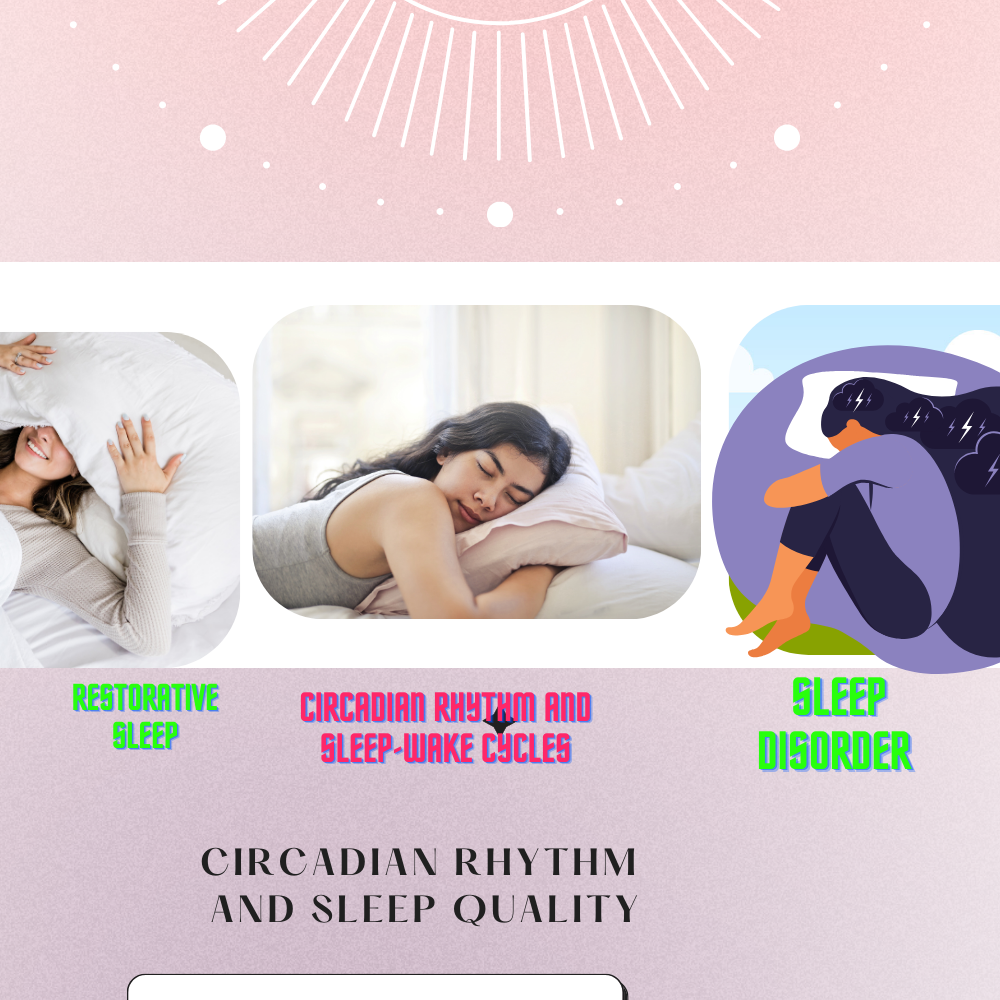
- Relationship between circadian rhythm and sleep-wake cycles: The circadian rhythm regulates the timing of sleep and wakefulness, promoting restorative sleep at night and wakefulness during the day.
- Importance of circadian alignment for restorative sleep: When the circadian rhythm is synchronized with the sleep-wake cycle, it promotes efficient sleep architecture, including the appropriate balance of rapid eye movement (REM) and non-REM sleep stages.
- Effects of circadian disruptions on sleep disorders: Disruptions to the circadian rhythm, such as jet lag, shift work, or irregular sleep schedules, can contribute to sleep disorders like insomnia, sleep apnea, and restless legs syndrome.
Health Implications of Circadian Rhythm Disruptions
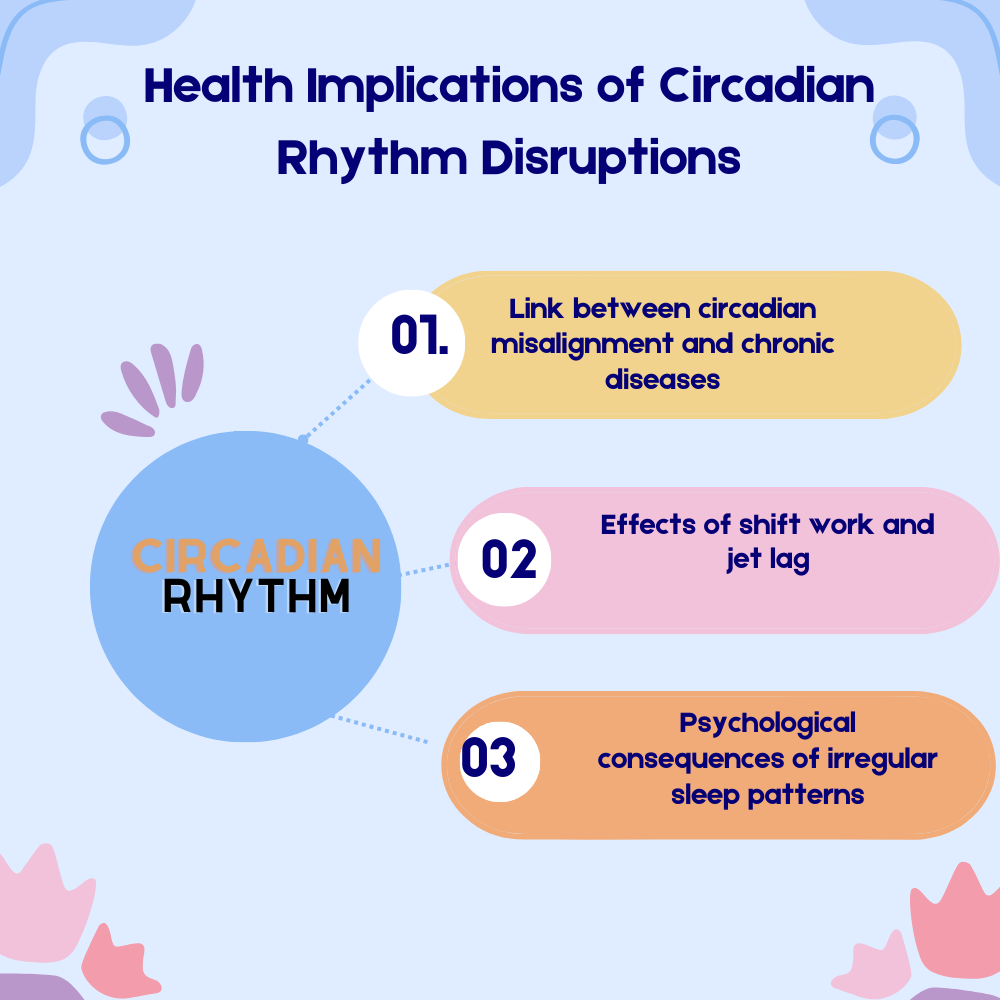
- Link between circadian misalignment and chronic diseases: Chronic circadian misalignment has been associated with an increased risk of cardiovascular disease, diabetes, obesity, and mood disorders.
- Effects of shift work and jet lag: Shift work and frequent travel across time zones can disrupt the natural synchronization of circadian rhythms, leading to sleep disturbances, fatigue, and impaired cognitive function.
- Psychological consequences of irregular sleep patterns: Circadian disruptions can contribute to mood disorders, such as depression and anxiety, as well as cognitive impairment and decreased productivity.
Strategies for Enhancing Circadian Rhythm
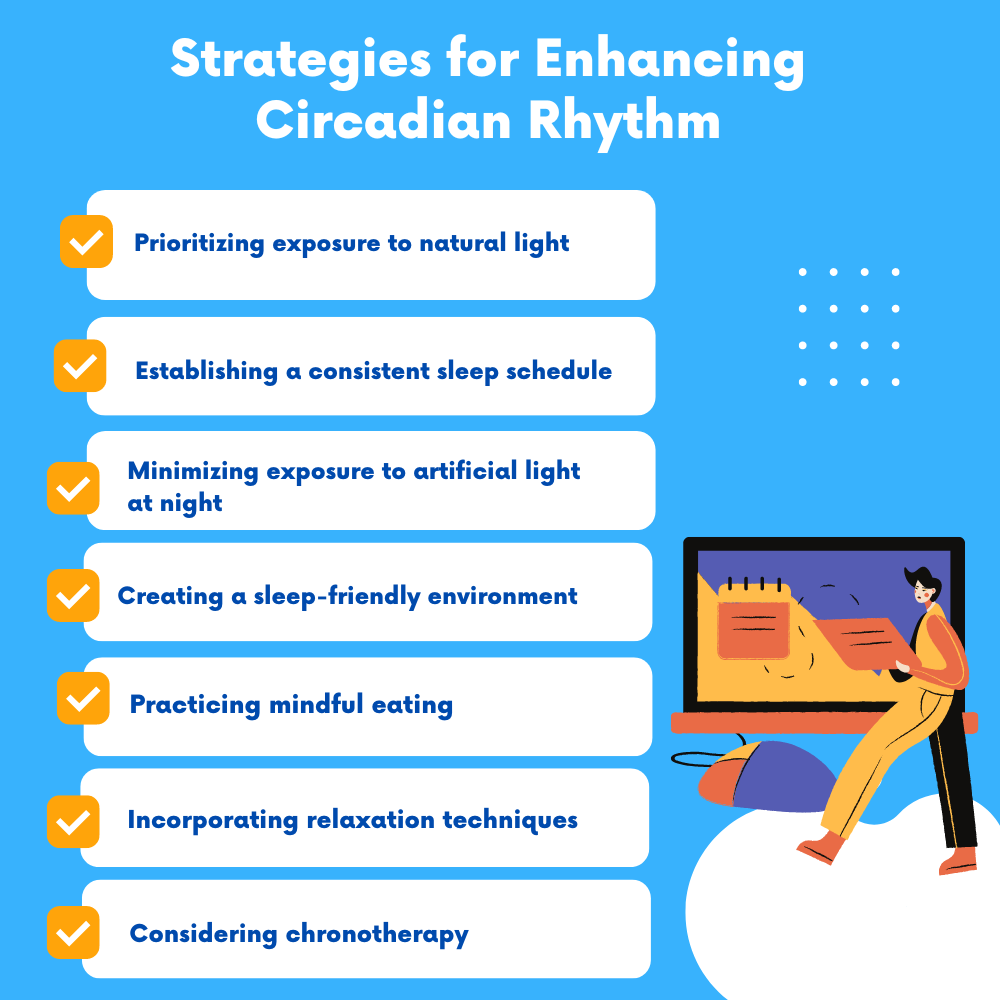
- Prioritizing exposure to natural light: Spending time outdoors, especially in the morning, can help reset the internal clock and synchronize circadian rhythms with the external environment.
- Establishing a consistent sleep schedule: Going to bed and waking up at the same time every day, even on weekends, helps reinforce the body’s internal clock and promote better sleep quality.
- Minimizing exposure to artificial light at night: Avoiding bright lights and electronic devices before bedtime can reduce the suppression of melatonin production and facilitate the natural onset of sleep.
- Creating a sleep-friendly environment: Optimizing the bedroom environment with features like comfortable bedding, adequate room temperature, and minimal noise can support restful sleep and circadian alignment.
- Practicing mindful eating: Following regular meal times and avoiding heavy meals close to bedtime can help regulate circadian rhythms and promote better digestion and sleep quality.
- Incorporating relaxation techniques: Engaging in relaxation practices such as meditation, deep breathing exercises, or gentle stretching before bedtime can help reduce stress and signal to the body that it’s time to wind down and prepare for sleep.
- Considering chronotherapy: In cases of circadian rhythm disorders or jet lag, chronotherapy may involve timed exposure to light and darkness to reset the body’s internal clock and adjust to new sleep-wake schedules.
Lifestyle Modifications for Better Circadian Rhythm
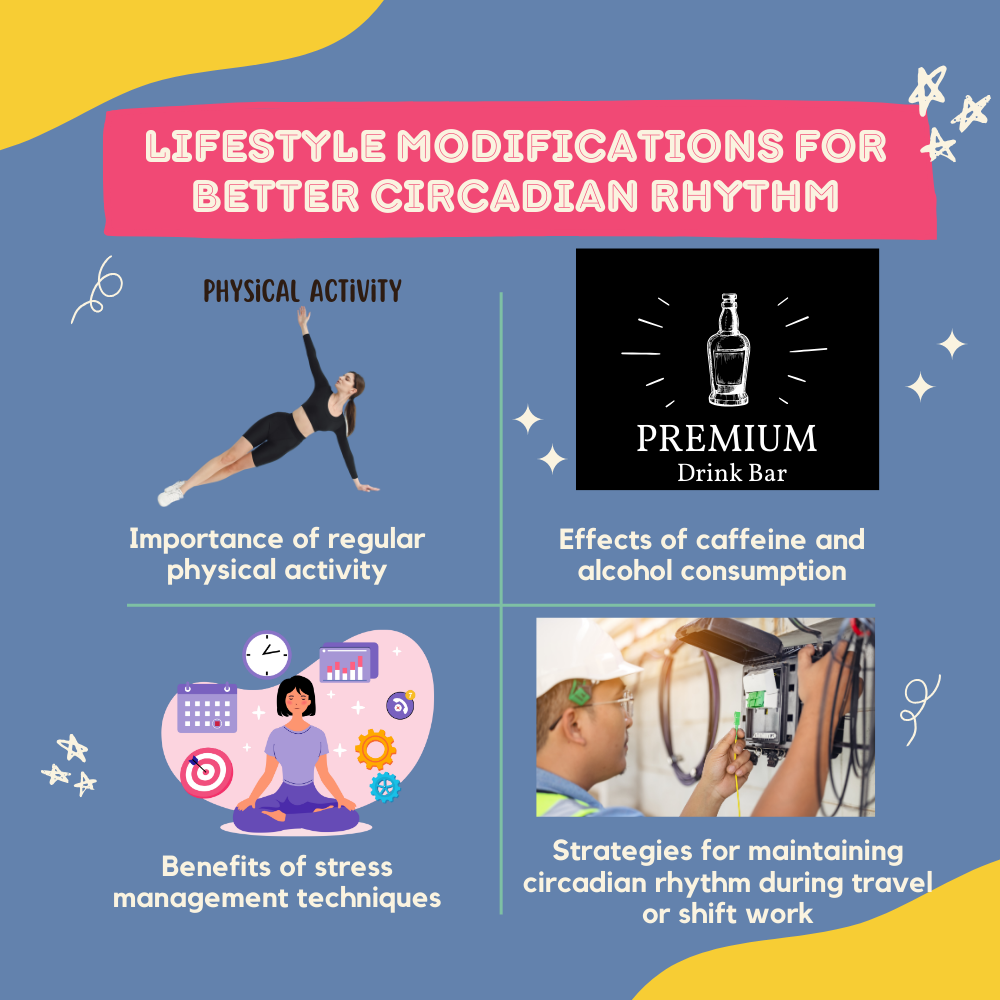
- Importance of regular physical activity: Regular exercise during the day can help regulate circadian rhythms, promote restful sleep, and improve overall health and well-being.
- Effects of caffeine and alcohol consumption: Limiting caffeine intake in the afternoon and avoiding alcohol close to bedtime can minimize disruptions to sleep patterns and circadian rhythms.
- Benefits of stress management techniques: Practicing stress-reduction techniques such as mindfulness meditation, yoga, or progressive muscle relaxation can help lower cortisol levels and promote better sleep quality and circadian alignment.
- Strategies for maintaining circadian rhythm during travel or shift work: Implementing gradual adjustments to sleep schedules, strategic exposure to light, and proper sleep hygiene practices can help minimize the impact of jet lag or shift work on circadian rhythms.
Monitoring and Tracking Circadian Rhythm
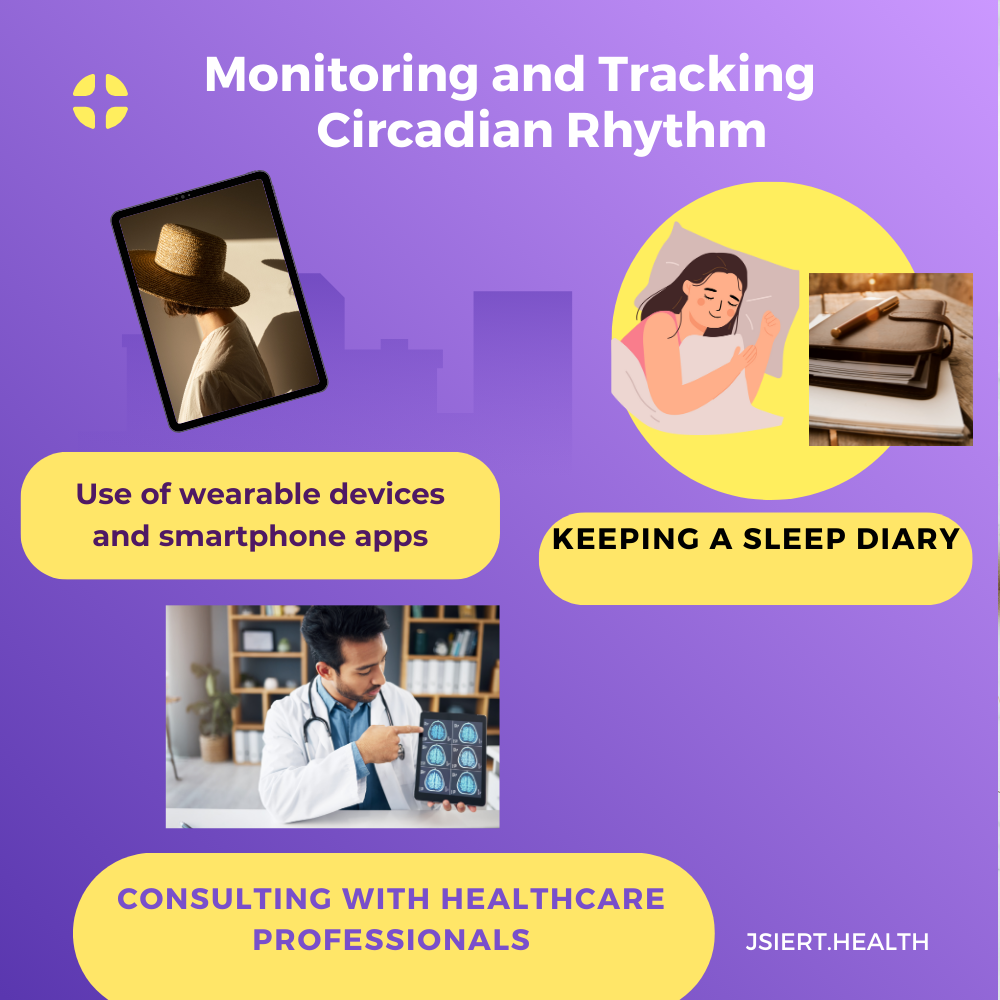
- Use of wearable devices and smartphone apps: Technologies such as fitness trackers and sleep apps can provide insights into sleep patterns, circadian rhythms, and overall sleep quality.
- Keeping a sleep diary: Recording daily sleep-wake times, sleep duration, and subjective sleep quality can help identify patterns or disruptions in circadian rhythms and inform adjustments to sleep habits and routines.
- Consulting with healthcare professionals: Individuals experiencing persistent sleep disturbances or circadian rhythm disorders may benefit from evaluation by sleep specialists or other healthcare providers, who can offer personalized recommendations, diagnostic testing, and treatment options.
Practical Tips for Improving Sleep and Health
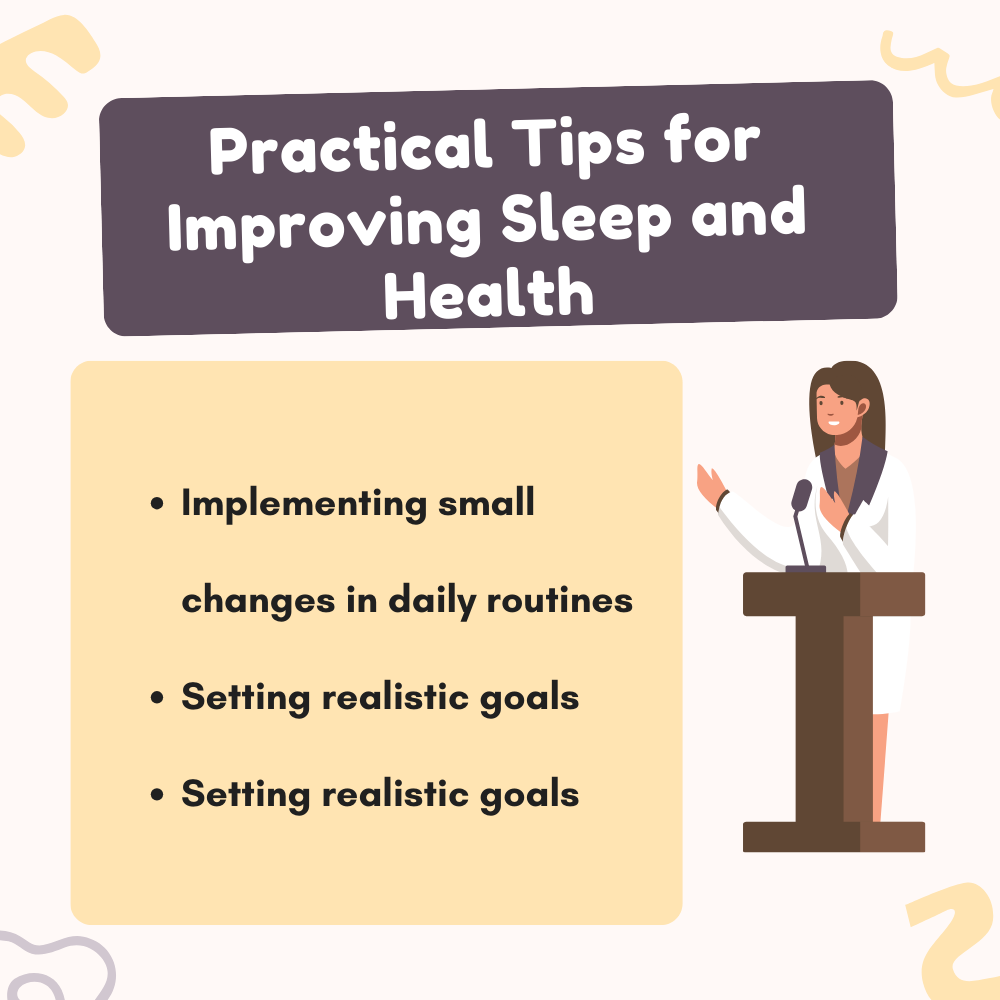
- Implementing small changes in daily routines: Gradually incorporating healthy sleep habits and circadian-friendly practices into daily routines can lead to sustainable improvements in sleep quality and overall well-being.
- Setting realistic goals: Establishing achievable goals for improving sleep hygiene and circadian alignment can help individuals stay motivated and track their progress over time.
- Setting realistic goals: Sharing sleep goals and progress with friends, family members, or support groups can provide encouragement, accountability, and motivation to maintain healthy sleep habits and circadian rhythms.
Conclusion
- Recap of key points discussed in the guide: Reviewing the importance of circadian rhythm for sleep and health, factors influencing circadian rhythms, strategies for enhancing circadian rhythm, and practical tips for improving sleep and overall well-being.
- Encouragement for readers to take proactive steps: Empowering readers to prioritize sleep health, adopt circadian-friendly habits, and seek support from healthcare professionals or community resources as needed.
- Emphasis on the long-term benefits
Some frequently asked questions about the role of Circadian Rhythm in the human body along with their answers:
- What is the circadian rhythm?
- The circadian rhythm is a natural, internal process that regulates the sleep-wake cycle and other biological functions in living organisms. It operates on a roughly 24-hour cycle and is influenced by environmental cues such as light and darkness.
- What is the role of the circadian rhythm in the body?
- The circadian rhythm plays a crucial role in regulating various physiological processes, including:
- Sleep-wake cycles: It helps synchronize our sleep patterns with the natural day-night cycle, promoting restful sleep at night and wakefulness during the day.
- Hormone secretion: It regulates the timing of hormone release, including cortisol (the stress hormone), melatonin (the sleep hormone), growth hormone, and others, which influence metabolism, mood, and other bodily functions.
- Body temperature: It helps regulate fluctuations in body temperature throughout the day, with temperatures typically peaking during the late afternoon and dropping during sleep.
- Metabolism and digestion: It influences the timing of hunger, digestion, and nutrient absorption, optimizing energy metabolism and nutrient utilization.
- Cognitive function: It affects cognitive performance, attention, memory, and alertness, with cognitive abilities typically peaking during the daytime and declining during the nighttime.
- The circadian rhythm plays a crucial role in regulating various physiological processes, including:
- What factors influence the circadian rhythm?
- The circadian rhythm is primarily influenced by environmental cues, particularly exposure to light and darkness. Other factors that can affect the circadian rhythm include:
- Social schedules and work routines
- Meal timing and patterns of food intake
- Physical activity levels and exercise timing
- Temperature changes and environmental conditions
- The circadian rhythm is primarily influenced by environmental cues, particularly exposure to light and darkness. Other factors that can affect the circadian rhythm include:
- What happens when the circadian rhythm is disrupted?
- Disruptions to the circadian rhythm, such as jet lag, shift work, or irregular sleep schedules, can lead to various health problems and symptoms, including:
- Sleep disturbances, insomnia, or excessive daytime sleepiness
- Mood disorders like depression and anxiety
- Impaired cognitive function, memory, and decision-making
- Metabolic disturbances, weight gain, and increased risk of metabolic disorders like obesity and diabetes
- Hormonal imbalances and disruptions to the menstrual cycle
- Increased susceptibility to certain diseases, including cardiovascular disease, gastrointestinal disorders, and certain cancers
- Disruptions to the circadian rhythm, such as jet lag, shift work, or irregular sleep schedules, can lead to various health problems and symptoms, including:
- How can I maintain a healthy circadian rhythm?
- To maintain a healthy circadian rhythm, you can:
- Establish a consistent sleep schedule by going to bed and waking up at the same time every day, even on weekends.
- Limit exposure to artificial light, particularly blue light from electronic devices, before bedtime.
- Spend time outdoors during the day, especially in the morning, to expose yourself to natural light and regulate your internal clock.
- Avoid caffeine, alcohol, and heavy meals close to bedtime, as they can disrupt sleep.
- Create a relaxing bedtime routine to signal to your body that it’s time to wind down and prepare for sleep.
- Exercise regularly, but avoid vigorous exercise close to bedtime, as it can interfere with sleep.
- To maintain a healthy circadian rhythm, you can:
- Can the circadian rhythm be reset or adjusted?
- Yes, the circadian rhythm can be reset or adjusted through various strategies, such as gradually shifting sleep and wake times, strategically timed exposure to light or darkness, and the use of melatonin supplements under the guidance of a healthcare professional. However, resetting the circadian rhythm may take time and consistency, and individual responses may vary.